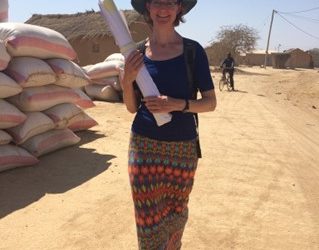Capitalism, Entrepreneurs and Business Associations at Work: New Ethnographies of Private Sector Dynamics in Africa
Call for papers for a thematic issue of the journal ‘Anthropology and Development’, To be coordinated by Thomas Bierschenk and José María Muñoz, to be published in 2021
This issue aims to explore ethnographically and analytically the links between emergent (or not) capitalism, private sector activities, entrepreneurs (in an economic sense) and their associations, the state and international development agencies in Africa.
The recent revival of the concept of capitalism in the social sciences has so far only had an uneven impact on African studies, which in recent decades have been dominated by other terms, e.g. “good governance”. In the background of this renewed interest in the concept of capitalism are old questions about the conditions for African countries to catch up economically. However, as far as Africa is concerned, contributions that pursue a theoretical-conceptual interest under the central concept of capitalism and at the same time treat this claim empirically have so far remained rather rare.
The new interest of scholars in capitalism as a framework for analysing economic development parallels the evolution of practical development policy paradigms. In the last decades, development policy has placed considerable emphasis on the reform of public institutions. More recently, this emphasis has been supplemented by the explicit promotion of the private sector. Private Sector Development (PSD) has become both a separate field of development policy, loosely coordinated in the Donor Committee on Enterprise Development (DCED), as well as a topos which has been taken up by development-economic research. As a policy paradigm, PSD concerns not only the promotion of small and medium enterprises, but also highly controversial programmes such as Investment Climate Reform or Business Environment Reform (BER), and especially the Doing Business (DB) initiative of the World Bank (2004). As a result, many NGOs have been enrolled, reluctantly at times, into programmes for the promotion of entrepreneurship and small-scale capitalism.
The Private Sector Development paradigm, as well as the specific agendas associated with it, nevertheless present a peculiar blind spot: how much private sector development have the programmes actually brought about, what is the nature of the emergent enterprises, and what position do the latter occupy in the societal set-up of their respective countries? The private sector can be marginal or large, indigenous or foreign-owned, inward-looking or extraverted externally-dependent (“extraverted”), it can be dominated by large companies, or made up by a myriad of small family businesses. Empirically, the answers to these questions have remained remarkably nebulous. This is all the more surprising as the Doing Business agenda, for example, has generated veritable competition, particularly among countries in the Global South, leading to simplification and reduction of business regulation. While there are lively debates on the meaningfulness and the ideological foundations of this agenda, there is noticeably less questioning of the kind of “business" that purportedly has made its way from Singapore to Mauritius or Rwanda as a result of DB-inspired reforms, and what this says about the changing (or not) character of African societies.
The question of capitalism as posed in the social sciences and the policy paradigm of private sector development converge in readings that see Africa as the last frontier of capitalism. This perspective is mainly represented in economic journalism; The Economist’s cover "Africa Rising" (3.12.2011) has become emblematic of this position, which was originally formulated by consultants such as McKinsey who spoke of "lions on the move" by analogy to catching-up capitalist development in Asia (Roxburgh et al, 2010). However, the proponents of the Africa Rising thesis are less interested in the economic development potential of African economies in a broader sense. They rather pursue an investor and market research perspective: in connection with the postulated rise of African 'middle classes', Africa is presented as a continent where (foreign) investors can make good money.
In this context, in recent years individual African entrepreneurs have been celebrated as the alleged avant-garde of economic and social development in Africa. One of the most prominent among them, Tony Elumelu, recently proclaimed at his annual Entrepreneurship Forum that "Africapitalism is taking centre-stage";[1] other prominent entrepreneurs like Yves Kabongo join in and declare themselves as radical africapitalistes.[2]
In fact, the existence of entrepreneurs or companies having private property rights can be seen as an essential, if not sufficient, feature of capitalism. A ‘Schumpeterian’ concept of entrepreneurship has long framed approaches to the trajectories of business organizations and business people in the African continent. Concerns about the need for entrepreneurs in Africa sound today as topical as they were in the late 1980s, when in one of the signal policy documents after a decade of structural adjustment, the World Bank (1989) highlighted the key role of entrepreneurs in the continent’s economic future. Despite significant changes in policy approaches and economic trends over the past three decades, calls to foster entrepreneurial energies on the continent have persisted, now tinged with a new sense of urgency in the light of massive youth unemployment (Dolan and Rajak 2016). The heroic figure of the entrepreneur also casts its shadow on much academic research that addresses the prospects of capitalism in Africa (Amaeshi and Idemudia 2015; Akinyoade, Dietz and Uche 2017). Often, this work tends to favour what is posited as productive, industrial, innovative, and national, at the expense of what is characterized as rentier, commercial, routine, and foreign. Despite its substantial effects on policy making and popular representations, the notion of entrepreneurship can become a straightjacket preventing justice being done to the complexities that shape the trajectories of firms and business people. The risk is to settle for an impoverished account of the “legacies, logics, and logistics” (Guyer 2016) that shape business activities. Accordingly, we invite papers that try to come to terms with the full complexity of business trajectories as contextualised in specific times and places.
The days when there was a need to ‘desacralize’ business organizations, so as to treat them as ordinary objects of anthropological study (Althabé 1991), are long gone. Large firms have become an established locus of ethnographic attention in a broad range of settings (Welker, Partridge and Hardin 2011). This may be less the case for the African continent, where studies of business trajectories and practices have been largely restricted to sectors with an important presence of multinational actors, such as the extractive industries (including two noteworthy recent monographs: Rajak 2011 and Rubbers 2013). This state of affairs results from a variety of factors, among which the comparatively small numbers of incorporated firms in most African countries is perhaps the most obvious. Indeed, the informalisation of economic activities has been a running thread of Africanist anthropologies, which has been interpreted both in terms of longue-durée historicity and as outcome of global economic trends and policy paradigms from the 1970s to the present. In this regard, it is hardly surprising that the anthropological corpus on business networks and actors is richer than that on firms, as the work represented in contributions aimed at sketching the state-of-the-art in the early 1990s shows (Labazée 1991; Copans 1991; see also the weight of anthropologists among the contributors to an important inter-disciplinary synthesis of that period: Ellis and Fauré 1995). This intellectual lineage lives on in recent ethnographic research, including two monographs that are exemplary for the effort they deploy in reconstructing the things, people, networks and companies that make pharmaceuticals in Nigeria (Peterson 2014) and pagnes in Togo (Sylvanus 2016) what they are.
An empirical focus on entrepreneurs highlights the class question in a broader sense. The editors of this issue are not only interested in the empirical study of entrepreneurs, but also in contributions which address the question whether they represent a class 'for themselves' that has an awareness of its own political-economic interests – a question which could be operationalized through an empirical focus on business associations. It connects with long-standing debates about the emergence of an indigenous class of capitalists in Africa and the related issues, such as whether this class has an awareness of its own existence and actively pursues its interests. In the 1980s, these issues featured centrally in the ‘Kenya debate’ on the conditions for economic development and the class position of African entrepreneurs (Leys 1975, Beckmann 1980, Kitching 1985). Borrowing from established Marxist terminology, we are not just asking how much "class is in the entrepreneurs", but also whether this class is, at least in some places, becoming a "class of its own" (Lukács 1923/1972; Badou and Bierschenk 2019)
We invite papers that touch on the following thematic axes, possibly including considerations of the particular methodological challenges of ethnographic research in these fields:
a) Business-state relations and business associations have been a long concern of social science research in Africa. We are interested in analyses that take stock of these and later contributions (MacGaffey 1987; Boone 1992; Forrest 1994; Munoz 2018) and move beyond crude readings about business dominance or impotence. While the thesis that business enjoys the standing of a privileged interest in capitalist societies remains a most sensible point of departure, it is also obvious that business influence varies according to the context. Both what political scientists of a Marxist persuasion used to call the structural power of business (as investor, taxpayer, and employer) as well as its instrumental influence need to be documented rather than taken for granted. Business options for political action (ranging from running for political office, financing political parties and creating agenda-setting think-tanks or research institutes, to investing in business associations, cultivating personal ties with government officials, and, more directly, buying influence) should be investigated by empirical research. As Hibou (2006) showed for the case of Tunisia under Ben Ali, analyses of business-state relations often are led astray by stylized accounts of business actors who either minimize visibility to protect themselves from political interference, or are forced into supporting the regime to avoid harassment or exclusion.
b) The expansion of private sector development (PSD) as an area of development assistance and government policy also warrants new research. The promotion of entrepreneurship through training and technical and financial support has been the focus of ethnographic contributions (Elyachar 2005) but such programmes represent only a small component of a much larger field of intervention. Efforts by multilateral and bilateral donors to advocate for ‘business environment reforms’, or to restructure specific economic sectors -- often through the creation or strengthening of business associations -- or the evolving arrangements for periodic government-private sector forums provide opportunities for innovative ethnographic research.
c) Attention to the built environment, technology, repertoire and performance can help shed light on shifting business practices in various areas, including the management of labour, relationships with suppliers and customers, financing, accounting, and taxation. Despite the reliance on bureaucratic form in the operations of large segments of the private sector in most countries in Africa, much remains to be learned about the everyday work of these business bureaucracies. As the reference to the notion of “at work” in the title of this call indicates, of particular interest are the tensions between norms and practices that have been explored in research on the state in Africa (Bierschenk and Olivier de Sardan 2014).
d) Business trajectories and cycles are another important area of interest that connects with longstanding concerns around, for example, social pressures against private accumulation or the mechanisms to enforce legal and contractual obligations. The recent anthropological and political science-interest on ‘success’ (Rowlands 1994; Banegas and Warnier 2001; Newell 2012) offers promising new directions of research on business identities, including their class dimensions. More generally, we invite contributions that explore the beginnings and ends of business ventures, specialisation and diversification, expansion and decline, success and failure under the constantly changing technological, legal and political conditions that prevail in diverse African settings.
Calendar:
Proposals for articles should be submitted by 2 January 2020 to Thomas Bierschenk (biersche@uni-mainz.de) and José Maria Muñoz (jmunoz@ed.ac.uk), as well as to the editorial staff of the journal (revue@apad-association.org).
Proposals for articles, of approximately 5,000 characters (including spaces), may be written in French or English.
The proposal must include:
- a title;
- a summary detailing the research theme and issue, as well as the materials on which the article is based;
- bibliographic references (not counted in the 5,000 character limit).
Each proposal must include the full names of the authors, their professional status and institutional affiliation, as well as their e-mail address.
16 January 2020: Authors will be notified of the contributions pre-selected by the coordinators and the journal's editorial board.
1 May 2020 : Submission of the first versions of the articles, in French or English. The articles must take into account the instructions of the journal for authors (cf. https://journals.openedition.org/anthropodev/523).
Works cited
Akinyoade, A., T. Dietz and C. Uche eds. 2017. Entrepreneurship in Africa. Leiden: Brill.
Althabé, G. 1991. ‘Désacraliser l'entreprise: un terrain ethnologique banal. Entretien par M. Sélim’, Journal des Anthropologues, 43-44: 17-21.
Amaeshi, K. and U. Idemudia. 2015. ‘Africapitalism: A management idea for business in Africa?’, Africa Journal of Management, 1(2): 210–223.
Badou, Agnès O., and Thomas Bierschenk. 2019. Les entrepreneurs Béninois et leurs associations : Un capitalisme sous tutelle. Working Papers of the Department of Anthropology and African Studies of the Johannes Gutenberg University Mainz), No. 186. Mainz: Institut für Ethnologie und Afrikastudien (https://www.ifeas.uni-mainz.de/files/2019/07/AP-186.pdf).
Banegas, R and J.-P. Warnier. 2001. ‘Nouvelles figures de la réussite et du pouvoir’, Politique Africaine 82: 5-21.
Beckman, B. 1980. ‘Imperialism and capitalist transformation: A critique of a Kenyan debate’, Review of African Political Economy, 19: 48-62.
Bierschenk, T. and J.-P. Olivier de Sardan. 2014. States at Work: Dynamics of African Bureaucracies. Leiden: Brill.
Boone, C. 1992. Merchant Capital and the Roots of State Power in Senegal, 1930-1985. Cambridge: Cambridge University Press.
Copans, J. 1991. ‘De l'anthropologie des travailleurs à l'anthropologie de l'entreprise : hypothèses africanistes’, Journal des Anthropologues, 43-44: 29-37.
Dolan, C. and D. Rajak. 2016. ‘Remaking Africa's informal economies: Youth, entrepreneurship and the promise of inclusion at the bottom of the pyramid’, Journal of Development Studies, 52(4): 514–529.
Ellis, S. and Y.-A. Fauré eds. 1995. Entreprises et entrepreneurs africains. Paris: Karthala.
Elyachar, J. 2005. Markets of Dispossession. NGOs, Economic Development and the State in Cairo. Durham: Duke University Press.
Forrest, T. 1994. The Advance of African Capital: The growth of Nigerian Private Enterprise. Edinburgh: Edinburgh University Press for the International African Institute.
Guyer, J. 2016. Legacies, Logics, Logistics: Essays in the Anthropology of the Platform Economy. Chicago: Chicago University Press.
Hibou, B. 2006. Force de l’obéissance : économie politique de la répression en Tunisie. Paris: La Découverte.
Kitchin, G. 1985. ‘Politics, methods and evidence in the Kenya debate’, in H. Bernstein and B. Campbell eds. Contradictions in Accumulation. Beverly Hills: Sage.
MacGaffey, J. 1987. Entrepreneurs and Parasites: The Struggle for Indigenous Capitalism in Zaire. Cambridge: Cambridge University Press.
Labazée, P. 1991. ‘Un terrain anthropologique à explorer: l’entreprise africaine’, Cahiers d’Études Africaines, 124, XXXI (4): 533-552.
Leys, C. 1975. Underdevelopment in Kenya: The Political Economy of Neocolonialism, 1964-1971. Berkeley: University of California Press.
Lukács, Georg. 1972, orig. 1923. History and Class Consciousness. Studies in Marxist Dialectics. Cambridge, Ma.: MIT Press.
Munoz, José-Maria. 2018. Doing Business in Cameroon. An Anatomy of Economic Governance. Cambridge: Cambridge University Press
Newell, S. 2012. The Modernity Bluff: Crime, Consumption, and Citizenship in Côte d'Ivoire. Chicago: University of Chicago Press.
Peterson, Kristin. 2014. Speculative Markets: Drug Circuits and Derivative Life in Nigeria. Durham: Duke. University Press.
Rajak, D. 2011. In Good Company: An Anatomy of Corporate Social responsibility. Stanford: Stanford University Press.
Roxburgh, Charles, Norbert Dörr, Acha Leke, Amine Tazi-Riffi, Arend van Wamelen, Susan Lund, Mutsa Chironga, Tarik Alatovik, Charles Atkins, Nadia Terfous, and Till Zeino-Mahmalat. 2010. Lions on the move: The progress and potential of African economies, McKinsey Global Institute Report
[http://www.mckinsey.com/Insights/MGI/Research/Productivity_Competitiveness_and_Growth/Lions_on_the_move; accessed 23.10.2019).
Rowlands, M. 1994. ‘The material culture of success: Ideals and life cycles in Cameroon,’ in J. Friedman ed. Consumption and Identity, pp. 106-19. London: Routledge.
Rubbers, B. 2013. Le Paternalisme en question: Les anciens ouvriers de la Gécamines face à la libéralisation du secteur minier katangais (RD Congo). Paris: L’Harmattan.
Sylvanus, N. 2016. Patterns of Circulation: Cloth, gender and materiality in West Africa. University of Chicago Press
Welker, M., D. Partridge and R. Hardin. 2011. ‘Corporate Lives: New Perspectives on the Social Life of the Corporate Form: An Introduction’, Current Anthropology, 52(S3): 3-16.
World Bank. 1989. Sub-Saharan Africa: From Crisis to Sustainable Growth. Washington: World Bank.
World Bank. 2004. Doing Business in 2004: Understanding Regulation. Washington: World Bank and Oxford University Press.
[1] www.tonyelumelufoundation.org/, visited 9/2019.
[2] Le Monde 25.6.2019, p. 15.
Articles similaires




